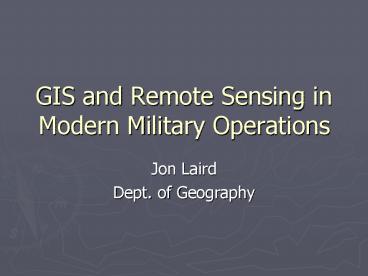GIS and Remote Sensing in Modern Military Operations Jon - PowerPoint PPT Presentation
1 / 16
Title:
GIS and Remote Sensing in Modern Military Operations Jon
Description:
GIS and Remote Sensing in Modern Military Operations Jon Laird Dept. of Geography Outline Background Former cruise missile technology Current cruise missile ... – PowerPoint PPT presentation
Number of Views:1462
Avg rating:3.0/5.0
Title: GIS and Remote Sensing in Modern Military Operations Jon
1
GIS and Remote Sensing in Modern Military
Operations
- Jon Laird
- Dept. of Geography
2
Outline
- Background
- Former cruise missile technology
- Current cruise missile technology
- GIS on the battlefield ESRI products for the
military - Future of GIS applied to small unit tactics
3
Former Cruise Missile Technology
- Navigation
- Inertial Navigation System (INS)
- Terrain Contour Matching (TERCOM)
- (later) Global Positioning System (GPS)
- Terminal phase
- Digital Scene Matching Area Correlator (DSMAC)
4
TERCOM
Tomahawk Cruise Missile Track using INS and TERCOM
Launch
- Multiple raster maps stored (all with same
dimensions) - Maps are DEMS of areas that have distinct
topography - Spatial resolution increases with each successive
mapprecision funneling
INS Navigation
Waypoint fix
Target
Stored map
Missile track
5
DSMAC and TERCOM
- Accurate 30-100 m
- Must obtain data for entire land surface of earth
- Very inefficient over flat areascircuitous route
necessary
Generate DEM from high-resolution satellite
imagery
Radar-altimeter used to compare elevation of
terrain with stored data
High-resolution imagery (spatial and radiometric)
Right time of daycorrect range of contrast
6
Next Generation MissileJASSM
- Joint Air-Surface Standoff Missile
- Navigation
- INS
- GPS
- Terminal Phase
- IR seeker
- Real-time target correlator
- Much more precise
7
GIS on the Battlefield ESRI
- Command and Control
8
GIS on the Battlefield ESRI
- Mission PlanningThreat Domes
9
GIS on the Battlefield ESRI
- Military Operations in Urbanized Terrain
10
GIS on the Battlefield ESRI
- Tracking and Monitoring
11
The Future GIS Integrated with Land Warrior
- Land Warrior System
12
What GIS can do for small units
- Command and control
- For company commanders, platoon and squad leaders
- Track movements and status of each person and
unit - Transmit messages, images, maps, to individuals
- Navigation
- View 2D or 3D maps of current location in
multiple views - GPS to direct toward waypoints
- Soldier identification and target discrimination
- Friendly troops
- Enemy troops
- Civilians
13
GIS for small units
- Terrain analysis
- Cross-country mobility
- Patrol base analysisOCOKA
- Observation and fields of fire
- Cover and concealment
- Obstacles
- Key terrain
- Avenues of approach
- Automated real-time data correction
- Communication with command center
- Field commanders can query GIS analysts at
command center to conduct terrain analysis or
least cost path
14
Desired end result complete integration of all
soldier systems and geospatial technologies on
every level
- Why?
- Maximize lethality
- Maximize economy of force
- Maintain unity of command
- Maintain increased level of security
- Eliminate accidents due to friendly fire (i.e.
Gulf War I) - Significantly diminish collateral damage
- Lessen number of decisions field commanders need
to make
15
Sources
- Federation of American Scientists
- ESRI
- US Army
- Centre for Defence and International Security
Studies - Defense Advanced Research Projects Agency
16
Questions/comments/suggestions?































